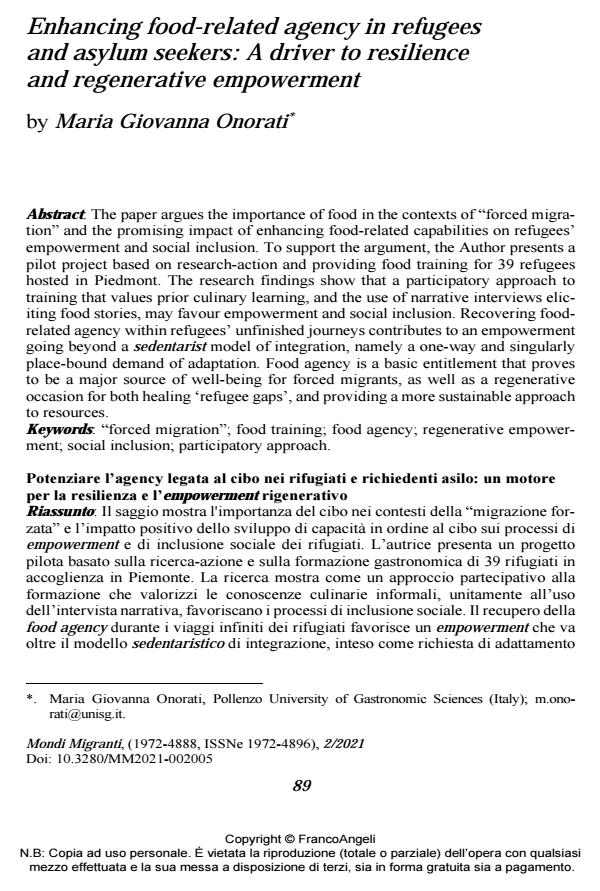Enhancing food-related agency in refugees and asylum seekers: A driver to resilience and regenerative empowerment
Titolo Rivista MONDI MIGRANTI
Autori/Curatori Maria Giovanna Onorati
Anno di pubblicazione 2021 Fascicolo 2021/2
Lingua Inglese Numero pagine 16 P. 89-104 Dimensione file 227 KB
DOI 10.3280/MM2021-002005
Il DOI è il codice a barre della proprietà intellettuale: per saperne di più
clicca qui
Qui sotto puoi vedere in anteprima la prima pagina di questo articolo.
Se questo articolo ti interessa, lo puoi acquistare (e scaricare in formato pdf) seguendo le facili indicazioni per acquistare il download credit. Acquista Download Credits per scaricare questo Articolo in formato PDF

FrancoAngeli è membro della Publishers International Linking Association, Inc (PILA), associazione indipendente e non profit per facilitare (attraverso i servizi tecnologici implementati da CrossRef.org) l’accesso degli studiosi ai contenuti digitali nelle pubblicazioni professionali e scientifiche.
The paper argues the importance of food in the contexts of "forced migration" and the promising impact of enhancing food-related capabilities on refugees’ em-powerment and social inclusion. To support the argument, the Author presents a pilot project based on research-action and providing food training for 39 refugees hosted in Piedmont. The research findings show that a participatory approach to training that values prior culinary learning, and the use of narrative interviews elic-iting food stories, may favour empowerment and social inclusion. Recovering food-related agency within refugees’ unfinished journeys contributes to an em-powerment going beyond a sedentarist model of integration, namely a one-way and singularly place-bound demand of adaptation. Food agency is a basic enti-tlement that proves to be a major source of well-being for forced migrants, as well as a regenerative occasion for both healing ‘refugee gaps’, and providing a more sustainable approach to resources.
Il saggio mostra l'importanza del cibo nei contesti della "migrazione forzata" e l’impatto positivo dello sviluppo di capacità in ordine al cibo sui processi di empo-werment e di inclusione sociale dei rifugiati. L’autrice presenta un progetto pilota basato sulla ricerca-azione e sulla formazione gastronomica di 39 rifugiati in ac-coglienza in Piemonte. La ricerca mostra come un approccio partecipativo alla formazione che valorizzi le conoscenze culinarie informali, unitamente all’uso dell’intervista narrativa, favoriscano i processi di inclusione sociale. Il recupero del-la food agency durante i viaggi infiniti dei rifugiati favorisce un empowerment che va oltre il modello sedentaristico di integrazione, inteso come richiesta di adatta-mento a senso unico e in un unico luogo. La food agency è un diritto fondamenta-le e un’importante fonte di benessere, oltre che occasione rigenerativa sia per col-mare i refugee gap che per sviluppare un approccio più sostenibile alle risorse.
Parole chiave:"migrazione forzata"; formazione alimentare; food agency; empowerment rigenerativo; inclusione sociale; approccio partecipativo.
- Healthy Ageing Futures for Older Women Asylum Seekers: Advancing Oral Histories and Futures Methods Jane Brooks, Sarah Marie Hall, Jayne Astbury, Elisabeth Boulton, Alex Hall, Chloe Arnull, in International Journal of Qualitative Methods 16094069251371822/2025
DOI: 10.1177/16094069251371822
Maria Giovanna Onorati, Enhancing food-related agency in refugees and asylum seekers: A driver to resilience and regenerative empowerment in "MONDI MIGRANTI" 2/2021, pp 89-104, DOI: 10.3280/MM2021-002005